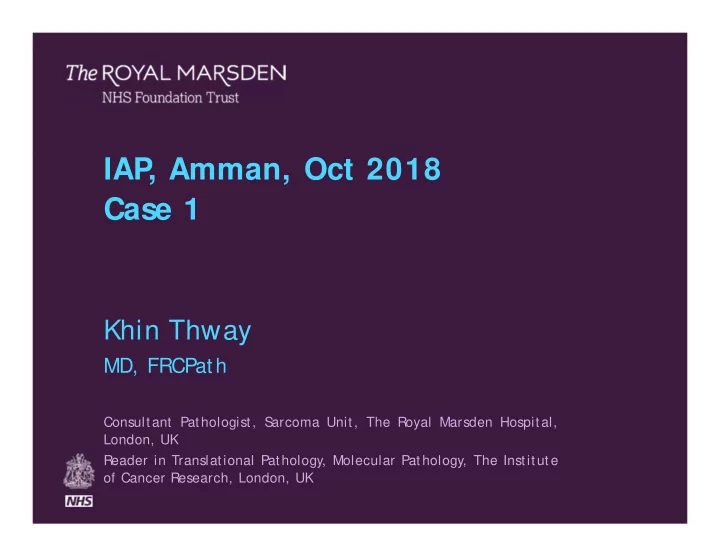

The Royal Marsden IAP , Amman, Oct 2018 Case 1 Khin Thway MD, FRCPath Consultant Pathologist, S arcoma Unit, The Royal Marsden Hospital, London, UK Reader in Translational Pathology, Molecular Pathology, The Institute of Cancer Research, London, UK
Case 1 39 year old male S evere abdominal pain CT: 12cm polypoid gastric tumor, resting on transverse colon 12cm partially necrotic gastric mass
Tumor in muscularis propria
Epithelioid cells
Clear cells
Pleomorphic cells
Pleomorphic cells
Pleomorphic cells Necrosis Atypical mitoses
Pleomorphic cells Abrupt transition between bland areas and pleomorphic areas
Immunohistochemistry AE1/AE3 AE1/AE3
Immunohistochemistry CD117 DOG1
Immunohistochemistry CD117 CD117
Immunohistochemical findings Positive Negative AE1/ AE3 CK7, CK20 Desmin, S MA, h-caldesmon DOG1 CD34 CD117 S 100 protein HMB45, Melan A
Molecular findings Mutation in exon 18 of PDGFRA No EWS R1-CREB1 or EWS R1-ATF1 fusions detected No evidence of MDM2 amplification
Pleomorphic cells Epithelioid cells
Diagnosis Dedifferentiated gastrointestinal stromal tumor PDGFRA mutation No previous clinical history De novo dedifferentiation
Gastrointestinal stromal tumor
Gastrointestinal stromal tumor S tromal tumors of GI tract of spindle or epithelioid morphology Immunohistochemically positive for KIT (CD117) Activating mutations in KIT or PDGFRA proto-oncogenes
Gastrointestinal stromal tumor Esophagus 5 Stomach 52 Small intestine 25 duodenum 15 j ej unum 35 ileum 45 Colorectal 11 Extra GI 7
Gastrointestinal stromal tumor 5-10% of all sarcomas 1% of GI malignancy M > F >50 yrs Pain, bleeding, mass Incidental Metastasis
Gastrointestinal stromal tumor
Gastrointestinal stromal tumor Paranuclear vacuolation Skenoid fibers
T Epithelioid GIS
Gastrointestinal stromal tumor Patterns Cytology Organoid Fascicular S pindle S toriform Epithelioid Palisaded Plasmacytoid S heet-like S ignet ring Myxoid Granular cell Organoid Giant cell
Gastrointestinal stromal tumor Plasmacytoid Patterns Cytology Fascicular S pindle S toriform Epithelioid Palisaded Plasmacytoid S heet-like S ignet ring Myxoid Granular cell Organoid Giant cell
GastrointestinaI stromal tumor % DOG1 100 90 80 70 60 50 40 30 20 10 0 CD 117 DOG1 CD 34 bcl2 SMA des cald calp S100 CK EMA About 5% of GIS T are KIT-negat ive; 75% posit ive for prot ein kinase C t het a
Response to imatinib therapy in GIS T Before After
Response to imatinib therapy in GIS T KIT mutations Exon 11 best (83.5% ) Exon 9 good (48% ) high dose, sunitinib Exon 13 good Exon 17 good Wild type poor ± S DH loss PDGFRA mutations Exon 12 good Exon 18 resistant ( D842V)
Wild-type GIS T S DH-deficient BRAF -mutant NF1-associated
GIS T Conventional Pleomorphic
Pleomorphic GIS T Chronic imatinib treatment Altered morphology Loss of CD117 Pauwels et al. , 2005 Vassos et al. , 2011 Antonescu et al ., 2016
Dedifferentiated GIS T Dedifferentiated features can also occur de novo Antonescu et al. , 2016
Dedifferentiated GIS T Mostly in stomach S mall bowel, colon, rectum M>F Older adults Antonescu et al. , 2016
Dedifferentiated GIS T ‘ Normal’ / original areas of GIS T: S pindle cells Rarely epithelioid cells Liegl et al. , 2009 Antonescu et al. , 2016
Dedifferentiation in GIS T Morphology Pleomorphic/ anaplastic Rhabdomyosarcomatous Epithelioid/ pseudopapillary 1 case ‘ angiosarcomatous’ Mitoses, necrosis Pauwels et al. , 2005, Liegl et al. , 2009, Zheng et al., 2013, Jiang et al. , 2015, Antonescu et al. , 2016
Dedifferentiation in GIS T Dedifferentiated GIST CD34 Complete CD117 loss (8/ 8) CD34 loss (5/ 8) Antonescu et al., 2016 Jiang et al. , 2015
Dedifferentiation in GIS T Dedifferentiated GIST Cytokeratin Gain of cytokeratin Gain of desmin Pauwels et al. , 2005 Antonescu et al. , 2016
Dedifferentiation in GIS T Mutational analysis No difference in KIT genotype between conventional and dedifferentiated components Pauwels et al. , 2005 Antonescu et al. , 2016
Dedifferentiation in GIS T FISH in CD117-negative component Loss of 1 KIT gene (3 cases) Low level amplification of KIT (2 cases) Genomic instability Antonescu et al. , 2016
Dedifferentiated tumors
Dedifferentiated tumors Dedifferentiation GIST S ubset of neoplasms High grade tumor, without evidence of line of differentiation of original neoplasm
Dedifferentiation Chondrosarcoma Chondrosarcoma Chordoma Liposarcoma S olitary fibrous tumor MPNS T Dermatofibrosarcoma GIS T Carcinoma Melanoma
Dedifferentiation Solitary fibrous tumor Arises de novo or as complication of recurrent, previously well differentiated tumor Abrupt transition Confers more aggressive behavior
Dedifferentiation Genetics S ame driving genetic mechanisms as original tumor Additional genetic abnormalities
Dedifferentiation Dedifferentiated solitary fibrous tumor STAT6 loss NAB2-STAT 6 gene fusion Maj or pathogenic driver STAT6 protein loss in dedifferentiated S FT but not malignant S FT
Dedifferentiation Dedifferentiated solitary Dedifferentiated fibrous tumor liposarcoma
Differential diagnosis Pleomorphic neoplasm GI tract/ viscera Cytokeratin positive
S arcomatoid carcinoma History of prior carcinoma Overlying epithelial dysplasia Features of glandular or other epithelial differentiation in other areas
‘ Collision tumor’ of pleomorphic tumor and GIS T e.g. S arcomatoid carcinoma with GIS T DDL with GIS T Rare
Pleomorphic sarcoma Diagnosis of exclusion Not associated with KIT or PDGFRA mutations No specific/ recurrent genetic findings Complex karyotypes
Dedifferentiated liposarcoma Dedifferentiated liposarcoma Most retroperitoneal MFH (UPS ) are dedifferentiated liposarcomas Coindre et al. 2003
Dedifferentiated liposarcoma Previous history of, or coexistent, well-differentiated liposarcoma
Dedifferentiated liposarcoma CDK4 Previous history of, or coexistent, well-differentiated liposarcoma CDK4, p16 and MDM2 expression
Dedifferentiated liposarcoma Previous history of, or coexistent, well-differentiated liposarcoma CDK4, p16 and MDM2 expression MDM2 amplification with FIS H
Dedifferentiated GIS T Dedifferentiated GIST Pleomorphic sarcoma
Dedifferentiated GIS T Clinical implications Distinct genetic background KIT or PDGFRA mutations Potential for targeted therapeutic strategies in future
Conclusions Dedifferentiated GIS T Diagnostic awareness Adequate sampling CD117 and CD34 loss Cytokeratin / desmin gain Post-imatinib or de novo Targeted therapies in future
The Royal Marsden IAP , Amman, Oct 2018 Case 1 Dr Khin Thway MD, FRCPath Consultant Pathologist S arcoma Unit, The Royal Marsden Hospital, London, UK Reader in Translational Pathology Molecular Pathology, The Institute of Cancer Research, London, UK
Recommend
More recommend